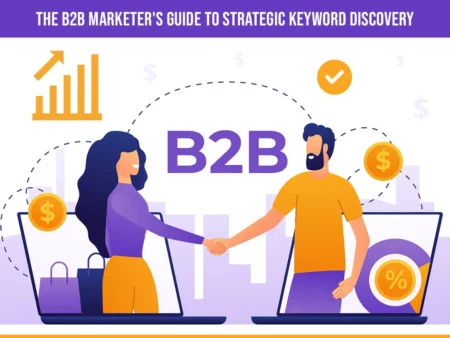
Keyword research for B2B (Business-to-Business) audiences is a crucial step in an SEO company’s strategy, requiring a different approach than B2C (Business-to-Consumer) keyword research. B2B keyword research focuses on understanding the specific needs, language, and search behavior of business customers. Here’s a guide on how an SEO company can conduct effective B2B keyword research:
- Understand Your Audience and Niche: Start by gaining a deep understanding of your B2B audience. This involves identifying their needs, challenges, and the solutions they are seeking. Study your niche to understand the industry jargon and the specific language used by your target audience.
- Develop Seed Keywords: An SEO company should create a list of seed keywords that are relevant to your business and industry. These should be broad terms that capture the essence of your products or services. These keywords can be generated from your understanding of the industry, products, or services you offer and from discussions with sales and customer service teams.
- Competitor Analysis: Analyze your competitors to see their target keywords. Tools like SEMrush or Ahrefs can be helpful for this. Look at their website and marketing materials to understand the keywords they are focusing on.
- Use Keyword Research Tools: Utilize keyword research tools like Google Keyword Planner, Moz, or Ahrefs to expand your list of keywords. These tools can help you find related keywords, understand keyword difficulty, and gauge search volume.
- Focus on Long-Tail Keywords: In B2B markets, long-tail keywords are particularly valuable. These are longer, more specific phrases that are less competitive and more likely to attract a highly targeted audience.
- Prioritize by Relevance and Intent: Not all keywords are equally valuable. Prioritize your keywords based on their relevance to your business and the search intent behind them. Keywords with a clear commercial intent should be given higher priority.
- Group Keywords into Clusters: Group similar keywords into clusters. This helps create more focused and relevant content for each set of keywords. Clustering keywords can also help in understanding the various subtopics within your niche.
- Analyze and Refine: Continuously analyze the performance of your chosen keywords. Use analytics tools to track their performance in terms of traffic and conversions. Refine your strategy based on this data.
- Integrate Keywords into Your Content Strategy: Once you have your list of keywords, integrate them into your content strategy. Create content that naturally incorporates these keywords, focusing on providing value and addressing the needs of your B2B audience for an SEO company.
- Monitor Trends and Adjust: The digital landscape and search trends can change rapidly. An SEO company must regularly monitor industry trends and adjust its keyword strategy to stay relevant.
Optimizing your online presence for businesses in the Tampa Bay Area is not just a recommendation; it’s a necessity. Tampa has a unique digital landscape with growing search trends like “near me” queries, which require a focused and localized SEO strategy. This is where Local SEO Tampa Company stands out. As a dedicated SEO marketing company in Tampa, they specialize in tailoring strategies to meet the specific needs of local businesses. With their proven track record of delivering tangible results and boosting business revenues, they are a go-to choice. Local SEO Tampa Company offers comprehensive solutions strategically designed to increase visibility and drive more leads to your business, whether it’s enhancing your Google My Business listing, conducting thorough keyword research, or crafting localized content strategies. When navigating the competitive digital marketplace in Tampa, partnering with Local SEO Tampa Company could be the key to unlocking your business’s potential online.
Picture Credit: Freepik
